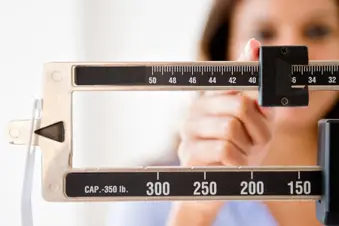
Maintaining a healthy weight is important if you have psoriasis. Research shows that carrying extra pounds makes psoriasis symptoms worse. In fact, the more you weigh, the more severe your symptoms are likely to be. The connection isn’t entirely clear. But what experts do know is that extra fat cells release inflammatory chemicals. Since psoriasis is an inflammatory disease, those chemicals may contribute to your psoriasis symptoms.
Losing even a few pounds may help ease psoriasis symptoms like itchy, flaky, and painful patches on your skin and scalp. One study found that people with psoriasis who lost weight -- by following a reduced-calorie diet and exercising -- saw a decrease in their symptoms by almost 50% in 20 weeks. That happened even though they made no other changes in their psoriasis medication or treatment plan.
Shedding pounds may make psoriasis and psoriatic arthritis medications more effective. (Psoriatic arthritis is a type of arthritis that affects some people with psoriasis.) Psoriasis puts you at a higher risk for many conditions, including heart disease, type 2 diabetes, and high blood pressure. Losing weight lowers your odds of getting these diseases. Even a small amount of weight loss eases pressure on your joints.
Simple changes can help you lose weight and improve your overall health.
Add More Plants to Your Diet
It’s not clear what diet is best if you have psoriasis. But experts know a healthy way to shed pounds while getting more health-boosting fiber, vitamins, and minerals is to eat more plant-based foods. These include fruits, vegetables, whole grains, and legumes like beans and peanuts.
Lean protein fills you up, which can curb cravings longer. In addition to lean poultry, like chicken and turkey, add fatty fish to your meals at least twice a week, too. Fish like salmon, trout, and herring are rich in omega-3 fatty acids. These ultra-healthy fats reduce your risk of heart disease and may help ease psoriasis symptoms. Steer clear of processed foods and anything with added sugar, including soda and other sweetened drinks.
If you’re new to healthy eating or don’t know where to start, a dietitian who specializes in skin conditions can help you come up with a plan. Your dermatologist should be able to recommend one. They can help you come up with a diet that addresses your psoriasis and helps you slim down.
Make Meals Mindful
When you’re more aware of what you eat, it can help you choose healthier portion sizes and foods. One simple way to start is by keeping a food diary. Writing down everything you eat can help you figure out if you’re more likely to overdo it at certain times, like after work or when you’re stressed. Just knowing that’s happening can help you make better choices.
Plan your meals in advance. That can reduce the odds you’ll give into temptation. If you’re eating out, look at the menu online beforehand. Decide what you’ll eat before you arrive at the restaurant. And eat breakfast every day. Filling up early in the day can lead to better choices in the afternoon and evening.
Get Moving
Exercise burns calories and builds calorie-burning lean muscle, both of which help with weight loss. It also eases inflammation throughout your body, which can improve your psoriasis while reducing your risk of related health problems like heart disease.
Aim for 30 minutes of exercise daily. If that sounds like a lot, keep in mind that even small amounts of activity can make a difference. Fitting in a few 10-minute walks throughout your day can add up. Take the stairs when you can, and try doing exercises like pushups and situps while you’re watching TV.
Stick With It
You may want to slim down quickly, but research shows that going slowly and steadily (about 1 to 2 pounds a week, max) is most likely to lead to lasting weight loss. A dietitian or doctor who specializes in weight management can help you find new strategies and ways of thinking that can lead to better health.
Show Sources
SOURCES:
Mayo Clinic: “Psoriatic Arthritis.”
Harvard Men’s Health Watch: “A deeper look at psoriasis.”
National Psoriasis Foundation: "Health Conditions Linked to Psoriasis,” “Active and Mindful Lifestyles.”
Cureus: “Effects of Weight Loss on Psoriasis: A Review of Clinical Trials.”
Cochrane Database of Systematic Reviews: “Lifestyle changes for treating psoriasis.”
Clinical Trials.gov: “Aggressive Weight Loss Program in Chronic Plaque Psoriasis.”
Dermatology Times: “Weight matters in psoriasis, psoriatic arthritis.”
Laura K. Ferris, MD, PhD, associate professor, University of Pittsburgh Medical Center, Pittsburgh.
Clinical, Cosmetic, and Investigational Dermatology: “Study on the use of omega-3 fatty acids as a therapeutic supplement in treatment of psoriasis.”
CDC: “Losing Weight.”